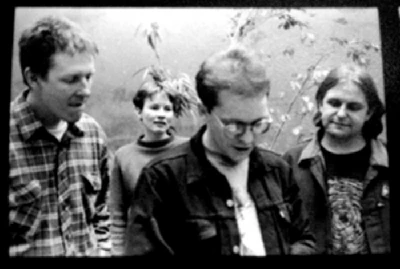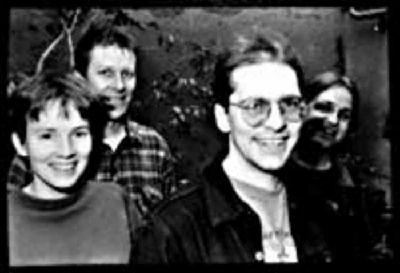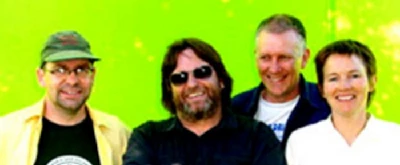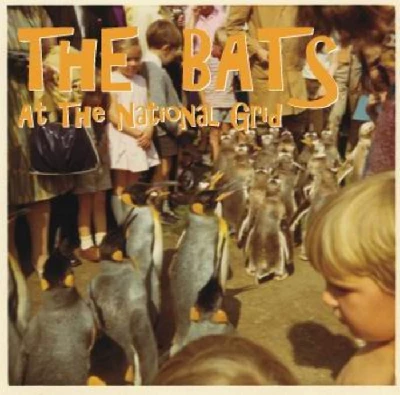Bats
-
Interview
published: 22 /
10 /
2005
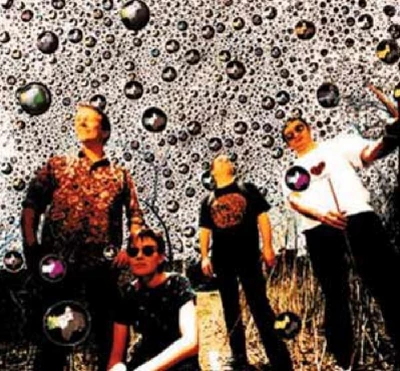
Jangly indie New Zealand rockers the Bats have just returned after with their first album in 10 years 'The Bats at the National Grid'. John Clarkson talks to bassist Paul Kean about it and why they have not really been absent from the music scene.
Article
It has been 10 years since acclaimed New Zealand jangly rockers the Bats last released an album. Now they have returned with a sixth studio album ‘The Bats at the National Grid’, which is so named because it was recorded in part at the National Grid studio in the group’s native Christchurch.
The Bats, whom first formed in late 1982, have always maintained the same line-up and consists of Robert Scott (vocals, guitar) ; Malcolm Grant (drums) and husband and wife Paul Kean (bass) and Kaye Woodward (guitar, vocals). One of the first acts to sign to the long-standing Flying Nun label, the Bats released their first EP ‘By Night’ in 1984. Two more EPs, ‘Music for the Fireside’ (1985) and ‘Made Up in Blue’ (1986) followed, before they released their debut album, ‘Daddy’s Highway’, which was partially recorded in Scotland, in 1988. A second album, ‘The Law of Things’, followed in 1989.
Those first two albums are now often seen showcasing the Bats’ classic sound, taking the group’ part jangle, part chiming guitars and fusing them with elements of folk pop, bluegrass and garage rock. As the reputation of Flying Nun, which had started out about the same time as the Bats as a small Christchurch cottage industry label, began to soar, it was bought over and became part of major label Warners. While the Bats had self-produced both ‘Daddy’s Highway’ and ‘The Law of Things’ on small budgets, ‘Fear of God’ (1992), their third album, was produced by name producer Nicholas Sansano who had worked with Sonic Youth and Public Enemy. Their fourth ‘Silverbeet’ (1993) found Sansano’s fellow American Lou Giordano who had worked with Sugar, the Lemonheads and the Goo Goo Dolls at the helm. The Bats also toured France with Television and the Wedding Present in France, and the USA with Radiohead and Belly at this time.
A fifth album, ‘Couchmaster’ (1995), the group’s last Flying Nun release, was once more self-produced, but had a darker, more brooding sound than its predecessors. ‘The Bats at the National Grid’, which is being released on different labels across the world including Pocket Music in New Zealand, Magic Marker in the United States and Egg Records in Britain, finds the Bats returning to the ramshackle and lively indie pop of ‘Daddy’s Highway’ and ‘The Law of Things’ and their roots.
Pennyblackmusic spoke to Paul Kean and found that, despite their decade long break in recording, the Bats, far from quietly disbanding as many have presumed, have remained active.
PB : The Bats are back after a nearly ten year hiatus. Why have you decided to come back ?
PK : We have actually been doing things occasionally in the mean time. We get together every year and have a bit of a play. Five years ago we actually put together a compilation of our greatest, almost hits called ‘Thousands of Tiny Luminous Spheres’ which also featured a couple of new tracks. Almost four years ago we did a live recording at a gig which unfortunately didn’t quite work out.
It might seem like 10 years since the last album but we have still occasionally still been doing things with the Bats. We have also all been working on other musical projects in the mean time as well.
PB : You never officially broke up or split up then ?
PK : No, never officially, although every now and then we read in the media that we have. We don’t know who to believe, or whether we should believe ourselves (Laughs).
PB : Robert Scott lives in Dunedin while the rest of you are based in Christchurch. How far is Christchurch from Dunedin ?
PK : It is five hours drive away, but three quarters of an hour flight. That has been one of the reasons for the slowing down in activities.
PB : How easy does that make rehearsing and songwriting ? If you don’t meet that often how do you prepare the songs?
PK : Robert is quite a prolific song writer. He’ll send tapes or CDs of new scratch songs that he has put together and then we’ll go through them and choose which ones we like, When we do get together we will fine tune and arrange those. It’s a good way of doing things. In the case of ‘The Bats at the National Grid’ there were four songs that actually came together in the studio.
PB : Which ones were those ?
PK : ‘Horizon’, ‘Flowers and Trees’ and the two instrumentals ‘Hubert’ and ‘We Do Not Kick’. We also developed ‘Pre War Blues’ a lot in the studio, but it had been pre written.
PB : Do you think the fact that you’re living apart and not on top of each other has in some ways accounted for why you have lasted so long ?
PK : Oh, definitely ! Robert lived in Christchurch originally, but has been in Dunedin since 1984. If we had been together all the time, I think then that people would have started to get on each other’s nerves. I’d like to play together and tour a bit more though, but it is a bit tricky. We have all got families now.
PB : You and Kaye have got two daughters. Has it been difficult combining being parents and playing in bands ?
PK : It was difficult when they were little ones. Rose is 15 now and Annabel has just turned 11. For us it is getting a little easier because they are getting a little more self-sufficient, and we have grandmas and friends who can do the babysitting (Laughs), but Robert has got young ones at the moment. It has become harder for him.
PB : Robert is the main songwriter. He is also the bassist with the Clean, and he’s got a solo career. Does he write songs specifically with each act in mind or does he just allocate songs depending upon the different demands of each act?
PK : When we know that we are going to be working towards an album, as well as sending us songs to see whether we want to do them or not, he does tend to write songs specifically which he thinks will fit the Bats. It’s not entirely one or the other.
PB : Kaye in more recent years has also started doing some of the Bats’ songwriting. You and Malcolm Grant and her are also in another band, Minisip.
PK : Minisip has been going for three or four years now. Kaye has only fairly recently realised that she can write songs (Laughs). We have been doing a lot of Minisip stuff, but we thought that it would be really cool to put more of Kaye’s song writing into the Bats. What we tend to do there is look at the different songs she has written and choose ones which are more suitable for the Bats.
PB : What’s the difference between Minisip and the Bats ? How do the songs differ ?
PK : Minisip features more of Kaye’s vocals. She’s the front woman, while in the Bats Robert has most of the lead vocals. People still say there is a strong element of the Bats in Minisip. We’re not going about trying to change who we are and how we approach music. We’re not going for stylistic changes and trying to get into jazz funk or anything like that (Laughs). We play music that we feel comfortable with, rather than thinking of formulas and fashions.
I am trying to encourage Kaye to do some stuff solo too and get out there and play to people. If the songs are complete in themselves she’ll be able to do that, but at the moment she is too shy.
PB : Your first record ‘Daddy’s Highway’ was partially recorded in Scotland and then finished off in New Zealand ? How did you end up recording it in Scotland ? You couldn’t have gone any further away to record it.
PK : Flying Nun opened up an office in London and we went over there just to tour and when we got there we got the offer to do some recording in London and so we did ‘Made Up in Blue’ at the Point Studios in London. The agent there said “There is this guy up in Glasgow who is keen to get you guys up there to play a few gigs. You can stay at his place and he has got a home studio.” When we got to Glasgow we were like “Can we play in your home studio ?” That was how that came together. It was great fun.
PB : You recorded ‘Fear of God’ with Nicholas Sansano and ‘Silverbeet’ with Lou Giordano. You had been doing a really good job of producing records by yourself up until that stage. Was that a good or a frustrating experience, or a bit of both ?
PK : It was very, very frustrating. That was management and the record company taking over. We said “Hey, look, we want to co-produce things. We’re not comfortable with someone stepping in and totally producing things” but unfortunately the record company had a different idea. I had done most of the producing of the Bats’ stuff up until that stage and would guide the band in the studio. Lou Giordano and Nick Sansano , however, looked to Bob being the song writer for direction in the studio and I was sidelined . It was very, very awkward (Laughs).
People jokingly say when they read an article in the paper or hear about our moderate successes abroad “Oh, you’re famous” and we go “Er, we don’t really want to be famous.” We have never felt comfortable with the big scene at all.
At that stage we were being pushed into trying to live that life of being famous rock star people. We had a new management team and they tried to push us in that direction. They tried to change the successful essence of what the Bats were. Originally we had people who were friends of the band driving things at the label, but as soon as they left the rest of the label were like “Okay, what’s this lot ?” “Oh, I don’t know. Just put them over there with what’s his name.”
We were bowled along on ‘Fear of God’ and ‘Silverbeet’ thinking “Why is that it doesn’t sound right ?” We weren’t given the opportunity to approve budgets either and the next thing we found out was that there was $100, 000 on us. If we had been allowed to record those records ourselves, as we had done with the first two albums, we would probably have only spent about a $1000 each of them .We would have got the essence of what we felt we sounded like, whereas the big studio jobs kind took some of the spark and energy out of it.
They are good albums in their own way. ‘Fear of God’ did very well, especially in France. They’re not total failures. They did have their own success and people talk admirably of them, but we don’t (Laughs).
PB : The new album was recorded at the National Grid in Christchurch. What kind of studio is that ?
PK : It’s a very basic kind of studio. They have actually just shifted it out of the place where we did the recording. The lease expired and the rent went sky high, so John Kelcher, who owns it, is currently building a new studio elsewhere in Christchurch. We recorded it on analogue and put the basic rhythm tracks down in the studio. It was a nice old building with good acoustics in the air. It turned out sounding really good. We then took it home to my and Kaye’s home studio and did overdubs at home. We put down most of the vocals there as well.
PB : Why did you decide to finish it off at home ? Was it just because of costs ?
PK : Partly costs and partly time. We all have day jobs. We didn’t have the time to book a block period in the studio and didn’t like much the idea of making various short bookings and recording it a little bit at a time over an extended period. We thought that we would just do it at home. It’s easy enough these days.
PB : How long did it take to come together ?
PK : It in fact ended up taking a lot longer than we hoped. We had just got everything digitised at home and we were laying up the tracks and doing overdubs and then both our computers were stolen in a break-in. We fortunately had back-ups of the original material from the studio, but it took a while for us to get our insurance sorted and for us to get new computers. Unfortunately I get really busy at certain times of the year with the job that I do, so there was this interval of about four months when we couldn’t really do a lot. Bob was also doing his solo stuff which also slowed things down.
We did the original recording three years ago now this coming Easter, got it finished it off last October and mastered in April. It has been a slow process as well getting it manufactured and arranging for record labels and things like that
PB : You have gone for quite a unique deal in which ‘The Bats at the National Grid’ is being released globally on several different labels. It has come out on Egg Records in Britain. Why did you decide to sign up with Egg Records ?
PK : We received an e-mail from Jim Kavanagh, who runs Egg Records saying “Check out this site ! There’s a thing on it about the Bats, reminiscing about when they were in Glasgow.” I checked out and saw that the site was connected to Egg Records and I thought “That sounds interesting. We’ll check out the label that it is connected with.” We didn’t realise that it was Jim who was involved with the label as well. We e-mailed saying “Are you interested in distributing the Bats over in the UK ?" and only then found out that it was Jim. It is nice to be connected with people who are fans of your music.
PB : Had you ever met Jim ?
PK : No. We first heard of him when he sent us the e-mail. He had come up to a gig we did in Glasgow when we were over there in 1986 at The Hub which was near the university. I’ve got no recollection I’m afraid though of meeting Jim. I do believe that he did speak to us at that gig. If we meet him again we might think “Oh, you’re that guy” (Laughs).
PB : A lot of old Oceanic groups have been reforming recently. The Go Betweens, the Tall Dwarfs, Radio Birdman, the Saints have all gone back on the road. INXS have meanwhile gone looking for a new singer on national television. Is that something that you have been at all conscious of when you have been promoting ‘The National Grid’ or is it something which has just been totally irrelevant to you ?
PK : That’s just been a totally random coincidence. Maybe we’re all in a situation where the families are grown up and we’ve all got a lot more time to spend on music again (Laughs).
PB : What has been the best experience about being in the Bats for you ?
PK : I love it live. I love having an audience dancing and moving along with us. The recording’s pretty fun too, but you can’t beat the live stuff and the songs which come through that. Sometimes a melody arrives which none of us have actually consciously thought of or composed. It just seems to arrive in the room when you’re playing and you pick up on it and you develop it. It is like a ghost piano or something like that. It’s pretty neat.
PB : The Bats are playing gigs in New Zealand pretty much every weekend at the moment. You have played a lot of gigs in the past abroad. Have you any plans to tour abroad ? Is that going to be possible ?
PK : We’re in the process of setting up a tour in Australia. We’re also interested in looking into going over to the States in March or April of next year. We’re looking into the logistics of that.
PB : Do you have any plans to come to Europe ?
PK : If you buy a ticket to get to the States you don’t have to pay a lot more to get across to Europe, so more than likely we would like to try to fit something in then. I can’t afford a lot of time away from New Zealand though because of family and commitments. We may take the children with us.
PB : What other plans do you have for the future ?
PK : People are keen to make videos for us. We’ve got one which is just about finished which is being made by a local filmmaker. It features some live footage of a gig we did a couple of months ago along with some underwater footage he has also taken. I am really looking forward to seeing that. There is an animator here in Christchurch that is keen to do a video for us as well. Peter Bannon who did our very first video for us of ‘By Night’ way back 20 years ago has been making ads and films since then, but is now really keen to get back and to do more music videos and has been in touch about working with us, so we are probably going to be doing something with him too. We’re being kept really busy. It’s a good time for us.
PB : Thank you for your time.
Picture Gallery:-
